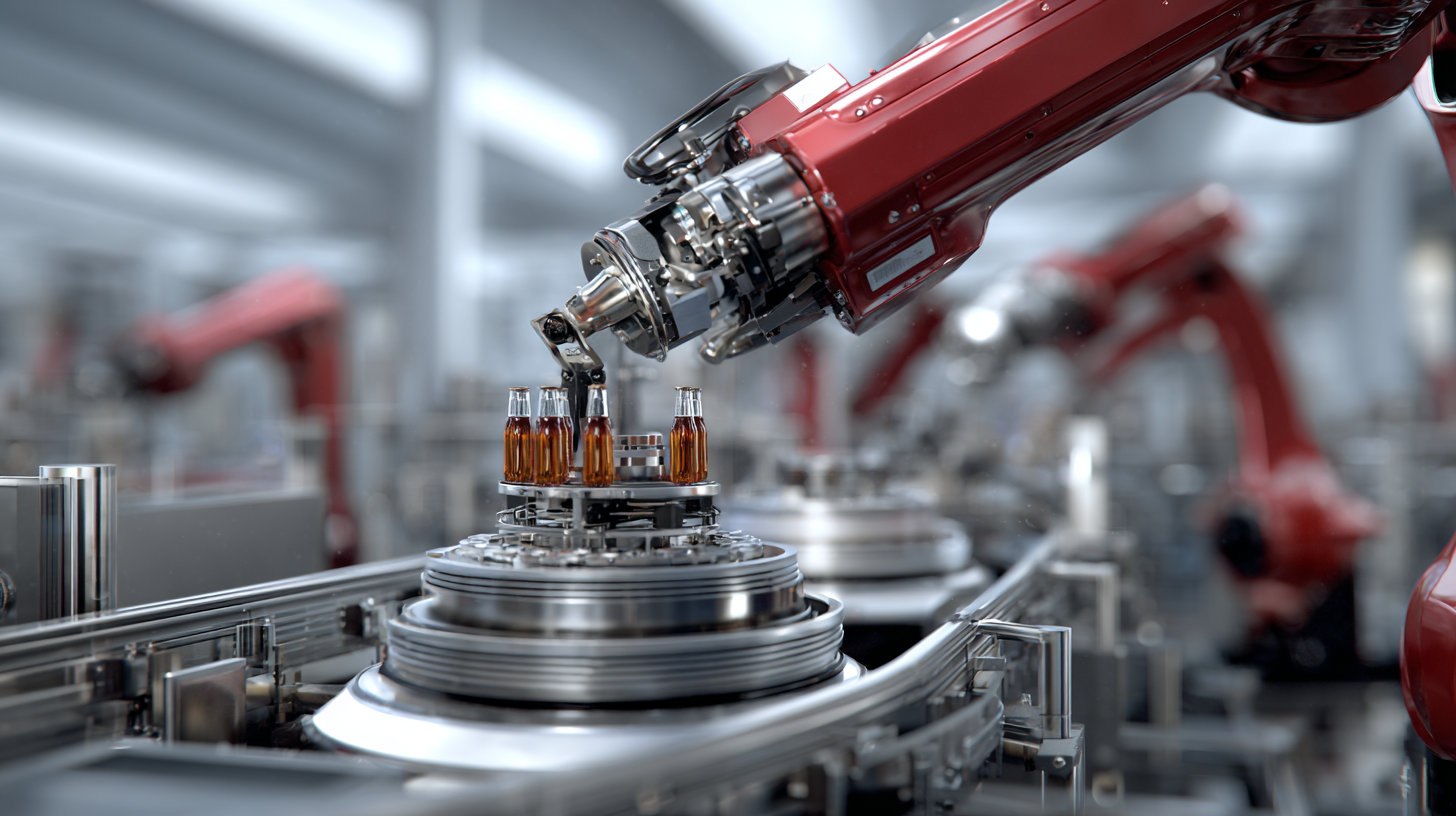Innovative Solutions for Best Manufacturer in Industry with Proven Results
In an era marked by rapid technological advancement, manufacturers are increasingly required to adapt their strategies to maintain competitive advantage. According to a recent report by McKinsey, over 70% of manufacturers are already investing in digital transformation initiatives, recognizing the potential for increased efficiency and production capabilities. As we look towards 2025, key trends such as the integration of AI, automation, and advanced data analytics will redefine industry benchmarks and operational standards. This blog will explore innovative solutions for leading manufacturers, highlighting proven results from sectors that have successfully embraced these technologies. By leveraging these insights, manufacturers can enhance their product offerings and streamline processes, positioning themselves as frontrunners in an ever-evolving marketplace.

Future-Ready Manufacturing: Key Technology Trends Shaping Industry 2025
As we look towards 2025, the manufacturing sector stands on the cusp of transformative advancements driven by emerging technology trends. According to a recent report by McKinsey, up to 45% of activities in manufacturing could be automated using current technologies. This shift not only enhances efficiency but also significantly reduces operating costs, making it imperative for manufacturers to embrace these innovations.
Key technology trends such as the Internet of Things (IoT), artificial intelligence (AI), and advanced robotics are reshaping the manufacturing landscape. For instance, a study by PwC indicates that companies adopting IoT solutions can improve their productivity by up to 20%. This technology enables real-time monitoring of machinery and processes, allowing manufacturers to anticipate issues before they become costly problems.
**Tips for Implementation**: Start small by integrating IoT sensors into critical machinery to gather data and analyze performance. Consider investing in AI-driven analytics platforms to transform this data into actionable insights. Lastly, ensure your workforce is equipped with training programs focused on new technologies to facilitate a smooth transition into this future-ready manufacturing environment.
Innovative Solutions for Best Manufacturer in Industry with Proven Results - Future-Ready Manufacturing: Key Technology Trends Shaping Industry 2025
| Technology Trend | Description | Expected Impact (%) | Adoption Rate (%) |
|---|---|---|---|
| Artificial Intelligence | Enhances decision making and predictive analytics | 30 | 70 |
| Internet of Things (IoT) | Improves monitoring and maintenance efficiency | 25 | 60 |
| Robotics Automation | Streamlines production processes and reduces labor costs | 40 | 45 |
| 3D Printing | Facilitates rapid prototyping and customization | 20 | 50 |
| Blockchain | Enhances transparency and security in transactions | 15 | 30 |
Harnessing AI and Automation: Revolutionizing Manufacturing Processes
In the rapidly evolving landscape of manufacturing, the integration of AI and automation has emerged as a game-changer, revolutionizing processes across various sectors. Recently, the Ministry of Industry and Information Technology recognized exemplary applications of AI in biotechnology, showcasing how advanced technologies can enhance innovation. With major companies entering the fray, AI is poised to transform industries like food and beverage, streamlining operations and improving product quality. This shift reflects a broader trend where manufacturers leverage AI to optimize efficiency and decision-making across their processes.
The drive towards automation is also evident within companies that are incorporating AI-driven solutions to facilitate material design and development. For instance, firms are now utilizing AI in conjunction with robotic automation, drastically reducing development timelines from years to mere weeks. By automating research and development workflows, these organizations are setting new benchmarks for innovation, creating a competitive edge that propels them ahead in their respective industries. As this trend continues, we can expect to witness an unprecedented transformation in manufacturing, characterized by enhanced productivity and groundbreaking advancements.
Sustainable Practices: Innovative Green Solutions for Modern Manufacturers
In today's manufacturing landscape, sustainability is no longer an option but a necessity. As reported by a 2021 McKinsey survey, 70% of manufacturers are actively prioritizing sustainability within their operations. This shift towards eco-friendly practices not only enhances corporate reputation but also leads to cost reductions and improved efficiency. For instance, adopting energy-efficient technologies can yield savings of up to 25% on energy bills, directly impacting the bottom line.
To successfully integrate sustainable practices, manufacturers can implement several innovative green solutions. One effective strategy is the adoption of circular economy principles, which emphasize waste reduction and resource optimization. By utilizing recycled materials and designing products for longevity, companies can significantly minimize their environmental footprint. Additionally, leveraging smart technologies, such as IoT and AI, allows for real-time monitoring of production processes to optimize resource usage.
Tip: Consider conducting a sustainability audit to identify areas for improvement. Regularly review data on energy consumption and waste generation to set achievable sustainability goals.
Furthermore, collaboration within the supply chain can amplify sustainability efforts. Partnering with eco-conscious suppliers and sharing best practices across the industry can lead to innovative solutions that benefit all stakeholders. Implementing these practices not only helps the environment but positions manufacturers as leaders in the evolving industrial landscape.
Tip: Engage employees in sustainability initiatives. Empowering teams to contribute to green goals fosters a culture of responsibility and innovation.
Leveraging IoT: Enhancing Efficiency and Productivity in Manufacturing
In today's rapidly evolving digital landscape, the integration of the Internet of Things (IoT) is revolutionizing the manufacturing sector, significantly enhancing efficiency and productivity. Industry reports indicate that the global automated material handling equipment market is projected to witness substantial growth, with a compound annual growth rate (CAGR) of approximately 10% over the next few years. This growth is attributed to the increasing demand for robotics, automated storage and retrieval systems, and other advanced technologies driving productivity and operational efficiency.

To capitalize on these advancements, manufacturers should consider embracing predictive maintenance solutions fueled by IoT and AI technologies. These tools not only minimize downtime but also elevate resource management, as evidenced by the data collection market, which is expected to see considerable expansion in the U.S. This increase will be driven by real-time data monitoring and the ongoing evolution of smart manufacturing applications.
Tip: Leverage IoT analytics to optimize your supply chain processes. Implement solutions that provide real-time insights, enabling proactive decision-making that aligns with manufacturing goals. Additionally, explore the benefits of integrating robotics into your operations; this can significantly enhance production timelines and reduce operational costs, paving the way for a more responsive and agile manufacturing environment.
Data-Driven Decision Making: Proven Strategies for Industry Leaders
Data-driven decision making has become an essential strategy for industry leaders seeking to maintain a competitive edge. According to a recent report by McKinsey, companies that leverage data and analytics are 23 times more likely to acquire customers, 6 times more likely to retain customers, and 19 times more likely to be profitable. These statistics highlight the importance of integrating data into the decision-making process to optimize performance and drive growth.
One effective strategy is to implement advanced analytics tools to gain insights into customer behavior and market trends. By analyzing data, manufacturers can better forecast demand, streamline operations, and enhance product quality. For example, the use of predictive analytics can help in preemptively identifying potential supply chain disruptions, thereby minimizing losses and maintaining operational efficiency.
Tips for enhancing your data-driven approach include fostering a culture of data literacy within your organization. Encourage team members to engage with data regularly and provide training on analytical tools. Additionally, prioritize gathering high-quality data; invest in technologies that ensure accurate data collection and management. This commitment will not only improve decision-making but also empower your organization to adapt swiftly to market changes.

